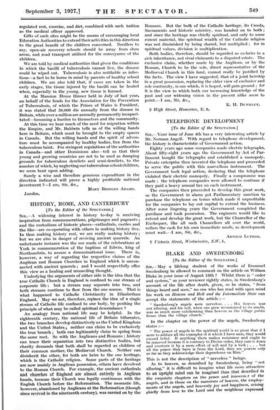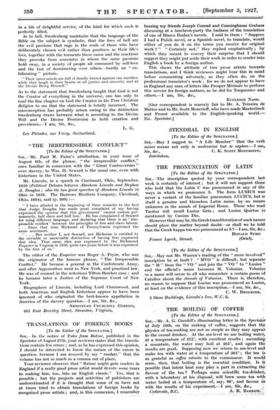BLAKE AND SWEDENBORG [To the Editor of the SPECTATOR.] SIR, —May
a lifelong student of the works of Emanuel Swedenborg be allowed to comment on the article on William Blake in your issue of August 18th ? Whilst there is " order and system," as your reviewer rightly states, in Swedenborg's account of the life after death, given, so he states, " from things heard and seen," no one who has read with open mind his work on Heaven and Hell and the Intermediate Slate can accept the statements of the article :— " Swedenborg's angels were nerveless.. . . His heaven was not alluring, and his hell, when one grew accustomed to its smells, was as much more exhilarating than heaven as the village public house than the village church. '
In the chapter on the power of the angels, Swedenborg states :-
" The power of angels in the spiritual world is so great that if I were to adduce all the examples of it which I have seen, they would exceed belief. If anything there makes resistance and ought to be removed because it is contrary to Divine order, they cast it down and overturn it by a mere effort of will and by a look ; . . . but all the power they have is from the Lord, they are powers only so far as they acknowledge their dependence on Him."
This is not the description of " nerveless " beings.
As to heaven, as described by Swedenborg, being not alluring," it is difficult to imagine what life more attractive
to an upright mind can be imagined than that described in the exquisite chapters on the peace and innocence of the angels, and in those on the mansions of heaven, the employ- ments of the angels, and heavenly joy and happiness, arising chiefly from love to the Lord and the neighbour expressed
in a life of delightful service, of the kind for which each is perfectly filled.
As to hell, Swedenborg maintains that the language of the Bible on the subject is symbolic, that the fires of hell are the evil passions that rage in the souls of those who have deliberately chosen evil rather than goodness as their life's love, together with the torments these cause and the reactions they provoke from associates in whom the same passions hold sway, in a society of people all consumed by self-love and the lust of domineering over others—hardly an " ex- hilarating " picture.
" Their inner minds are full of deadly hatred against one another, while they laugh in their hearts at all justice and sincerity and at the Divine Being Himself."
As to the statement that Swedenborg taught that God is not the Creator of everything in the universe, one has only to read the fine chapter on God the Creator in his True Christian Religion to see that the statement is totally incorrect. The misconception has probably arisen owing to the distinction Swedenborg draws between what is according to the Divine Will and the Divine Permission in both creation and providence.—I am, Sir, &c.,
L. G.
Les Pleiades, sur Vevey, Switzerland.











































 Previous page
Previous page